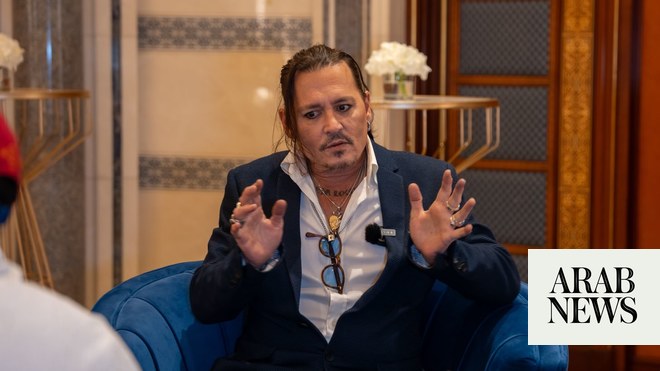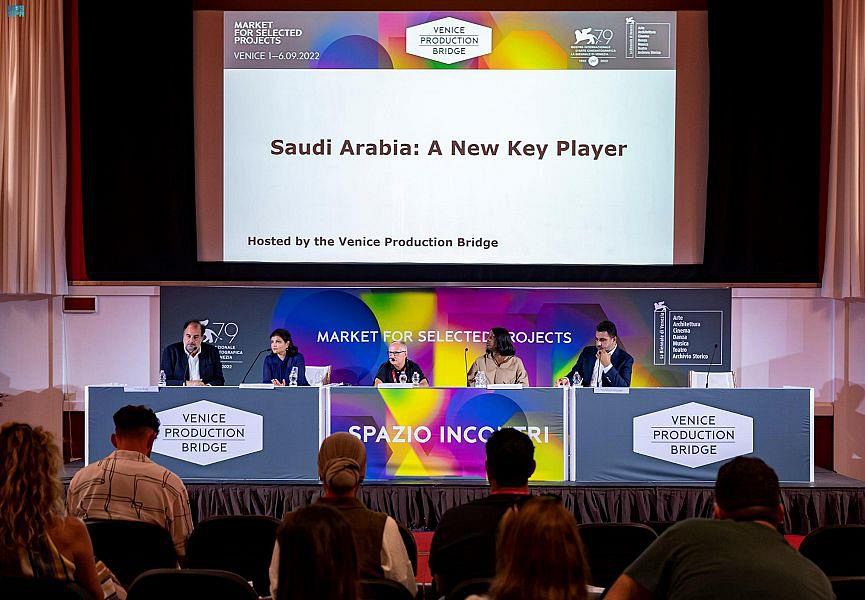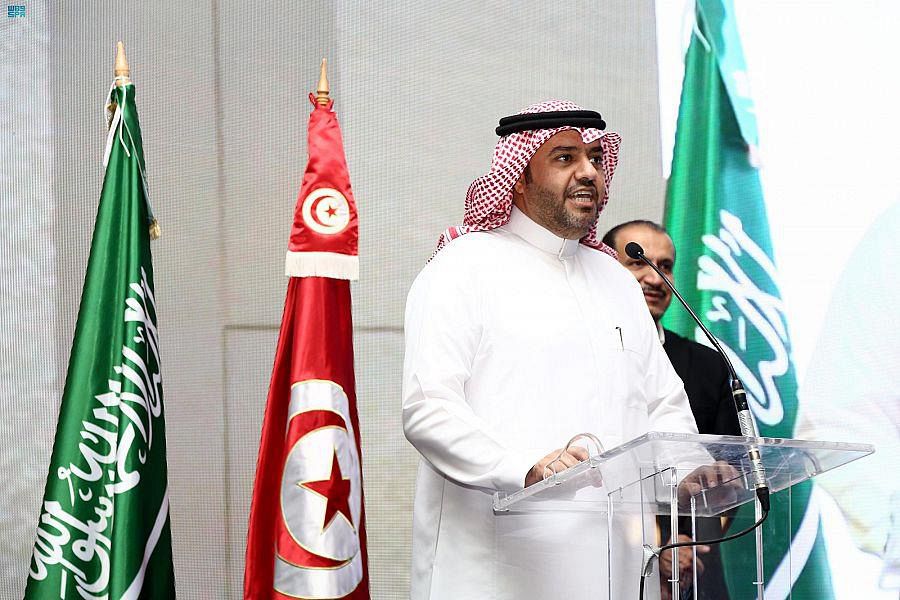
DUBAI: A husband and wife fight as their marriage deteriorates and their home is overtaken by “evil spirits.” A bride disappears during her wedding, leaving her guests waiting and her mother in meltdown. A pregnant woman tries to distinguish reality from dreams, drug-induced delusion and perceptions of death.
These are just some of the enticing story lines of recent Saudi movie releases. The last of these, “Rupture,” is a film by Hamzah K. Jamjoom, which won top prize in the Red Sea International Film Festival’s Saudi film category in December.
Four years ago, screening such films in Saudi Arabia, where cinemas were banned for more than 30 years between 1983 until 2018, was unthinkable. But now, as the Kingdom pushes its Vision 2030 reform agenda, it is aiming to become the Middle East’s new film industry powerhouse and instill in Saudis a love of watching and making movies.
So far, the plan is working. International producers and Hollywood studios are flocking to the Kingdom to produce films and strike deals in a fertile new market. Cinemas are seeing exponential growth as screens open and Saudi households flock to theaters. According to Comscore, box-office market revenues in Saudi Arabia rose to $238 million in 2021 — a 95 percent increase from 2020.
Importantly, there are now numerous incentives for young Saudi filmmakers to develop their craft at home. The Saudi government is investing billions in building a film industry with international and regional ambitions.
During the Red Sea Film Festival in Jeddah in December, the Ministry of Investment announced that the Kingdom would support the production of 100 films by 2030.
A Saudi film fan taking a selfie next to a sign showing the logo of the Red Sea Film Festival last year at the entrance of old Jeddah. (AFP/File Photo)
For many young Saudis this is a dream come true — even if many cannot quite believe their eyes. Until 2018, aspiring filmmakers often had to shoot in secret, dodging religious police to do so. The challenges became so frustrating for many with ambitions that they left to produce films and build careers abroad.
“Saudi filmmakers have always been there, fascinated by storytelling, but it is so fresh that film is now becoming an industry in Saudi Arabia,” Sarah Taibah, a Saudi actress and film writer, told Arab News.
“This is now a surreal dream that has now actually become a reality and I am so glad to be part of this industry at this early stage. People are now hungry to hear our stories.”
The boom is prompting many Saudi filmmakers and professionals who have been based and working abroad for years to come home and work in their own country. Ahd Kamel, 41, a well-known actress and filmmaker, is one of them.
“There was a ban on films my entire lifetime — it was taboo,” Kamel told Arab News. “When I started doing films I was told: ‘Absolutely, not. This is not something you can do.’ I had to define myself as a filmmaker on the other side of the river. It’s been 40 years of my life. It’s baffling, amazing and wonderful. When you are young you are pigeon-holed about what is happening but now, I can see that in a lifetime, things can really change.”
As the Kingdom pushes its Vision 2030 reform agenda, it is aiming to become the Middle East’s new film industry powerhouse and instill in Saudis a love of watching and making movies. (AFP/File Photo)
In 2012, Kamel played a conservative teacher in the film “Wadjda,” which was directed by Haifaa Al-Mansour, the first Saudi feature directed by a woman and the first feature film shot entirely in Saudi Arabia. Kamel is now preparing to shoot a new film in the Kingdom about her family’s driver, who died recently.
Mona Khashoggi, a film and theater producer who was based in London for 20 years, has now returned to her hometown of Jeddah to take part in what amounts to a cultural revolution.
“Even when we didn’t have cinemas, we are all very cultured and many Saudis had cinemas in their homes,” she told Arab News. “What I want to see in Saudi films is not films about oppression that the West is expecting and stereotyping but stories about the youth and women who are now building their lives in this new reality in the Kingdom.”
A major attraction for foreign investors is the fact that 70 percent of the Kingdom’s 34 million population is under the age of 30 and have money to spend. Telfaz 11, a studio specializing in locally relevant content and Saudi Arabia’s youth culture, is growing rapidly thanks to internal and foreign investment.
Alaa Yousef Fadan, Ali Al-Kalthami and Ibrahim Al Khairallah founded Riyadh-based Telfaz 11 just over 10 years ago, and immediately set about revolutionizing content creation for young people via YouTube. IN NUMBERS
* 138 Films screened at Red Sea International Film Festival in December 2021.
* 60 Countries whose films were shown at Red Sea International Film Festival.
* 36 Saudi-made films shown at Saudi Film Festival in Jeddah in July 2021.
In November 2020, Telfaz 11 struck a deal with Netflix to produce eight feature films as the streaming platform sought to break into the Middle Eastern market. Then, in December, Telfaz 11 secured a multimillion-dollar funding line from a consortium of high-profile local financiers.
It acquired Last Scene Films, a production house also based in Riyadh, and is setting up Wadi Cinema, an independent cinema house in a joint venture with Muvi Cinema, the first home-grown cinema brand in the Kingdom.
The company has big ambitions. Faden says he and his partners will use the latest funding “to build its development and production slate ... . The company’s focus is to be the premiere destination for filmmakers and talent throughout the world.”
The changes are nothing short of revolutionary. Cinema, however, was not completely foreign to the Kingdom, even in the days when it was banned. Film fans remained determined to watch movies in the company of fellow enthusiasts.
The Saudi Film Festival, which will in its eighth edition in June 2022, was founded in Dammam in Eastern Province in 2008 by Ahmed Al-Mulla and colleagues at the local Literature Club.
The picturesque landscape of AlUla has seen it grow into an exotic filming destination, with Film AlUla providing an ecosystem of skilled professionals for both domestic productions, and international film projects. (Supplied)
“A lot of people in the 1980s and 1990s, like me, loved cinema, but didn’t have cinema in public to watch,” Al-Mulla recalled.
When Al-Mulla became a member of the board of the Literature Club, he began discussing with other members how to screen films. For nearly two years, they managed to discreetly screen films, including local productions, every Sunday night.
“We had many clashes with the other side who believed cinema was forbidden,” he told Arab News. “But we believed we had the right to see movies, and this is part of our culture and part of our mandate as the Literature Club.”
In 2016, two years before cinemas were officially reopened in the Kingdom, the King Abdulaziz Center for World Culture joined the club as a strategic partner and, since then, the Saudi Arabian Society of Culture and Arts has organized the Saudi Film Festival.
The current wave of producers, writers and actors have much to thank the enthusiasts in Dammam for in keeping cinema alive and nurturing early pioneers in domestic filmmaking.
Saudi actor Saed Khader (C) waves his award for at the opening ceremony of the fourth Saudi Film Festival held in Dammam City. (AFP/File Photo)
“It was all done underground,” said Al-Mulla. “There were no opportunities then to film or get financing. Everything depended on the individual.”
Last but not certainly not the least, cinema’s comeback in Saudi Arabia has given women, who now have many more freedoms than they did previously, a much stronger voice.
“Over the last few years, I have been getting more requests to do films about Saudi women,” Taibah, the actress, told Arab News.
“People want films by Saudi women that tell stories about Saudi women. This is all very fresh. I feel so blessed it is finally happening, because no one tells our story better than us.”












